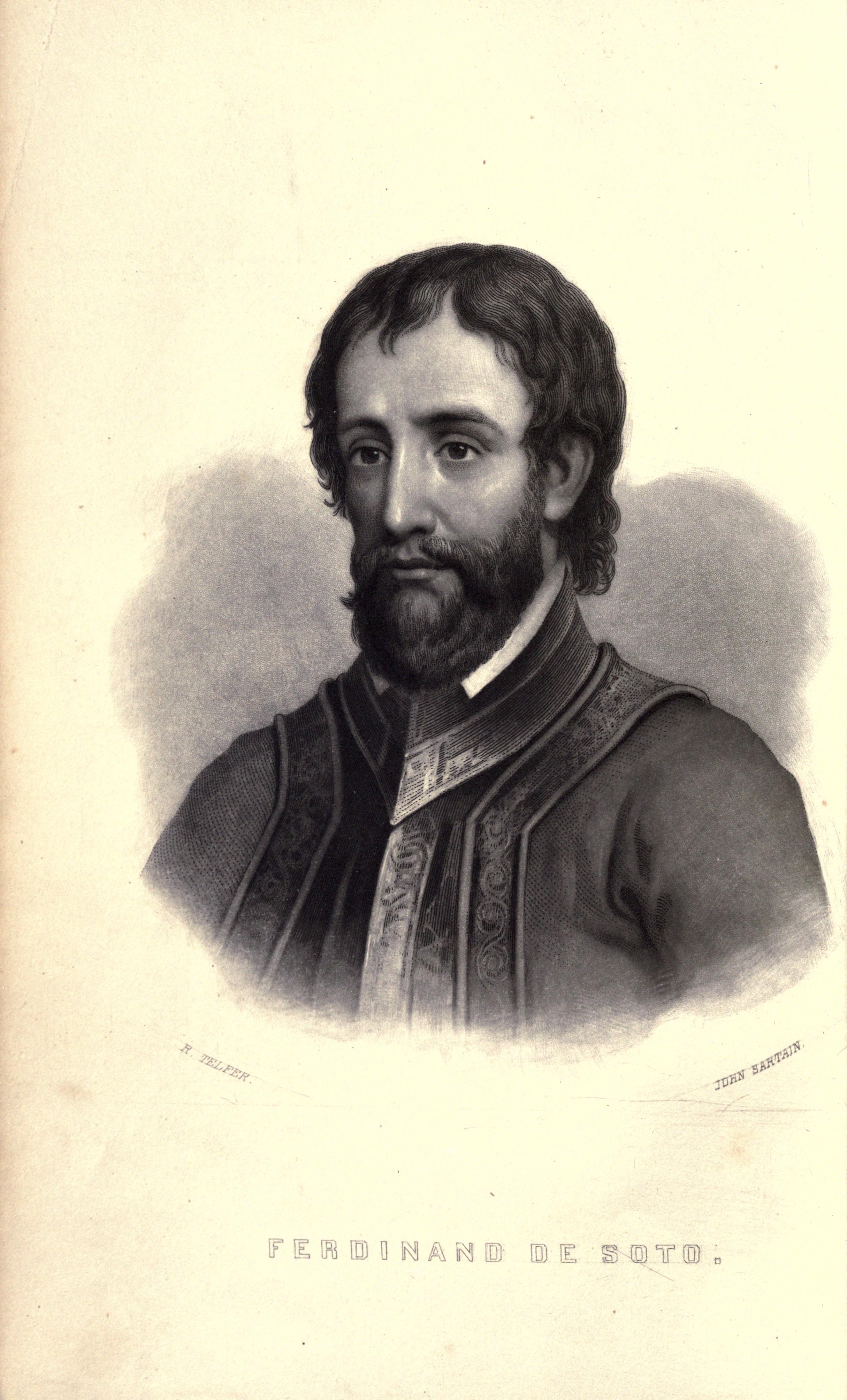
Hernando de Soto.
"A Translation of an Original Letter of Hernando de Soto."

Hernando de Soto.
Public
domain image from the Internet Archive.
|
AUTHORITIES OF ST. JAGO DE CUBA.
Most noble Sirs:
Since my arrival in this country, I have written three letters by different opportunities to Havana, and without being honored with a reply to either, I embrace this occasion to address you another, believing it will always be agreeable to you to hear from me. I sailed from Havana with my fleet on Sunday, May 18th, although I had written you I would not weigh anchor before the 25th. I set sail sooner than I had intended, in order to profit by a favorable wind. We had no sooner, however, entered the Gulf than we were becalmed, which prevented us from reaching this coast before Whitsunday the 25th. We missed our port by five or six leagues through the carelessness of the pilots, which obliged me to embark on board of one of the brigantines to go in search of it, which detained me three days more. But another cause of this delay was my ignorance of the channel, which led me into a bay some twelve leagues or more inland, from which I found it difficult to extricate myself. This loss of time, therefore, obliged me to send Vasco Parcallo de Figueroa, my lieutenant general, with the brigantines to take possession of a village at the foot of the bay, and I ordered him to land all the troops and horses there, where I afterwards joined him, with some difficulty, on Trinity Sunday. The Indians became frightened, and deserted the country, so that in a distance of thirty leagues or more we did not meet with a human being.
As soon as I landed I was informed that a Christian was in the power of a cacique of the country. I accordingly dispatched Baltasar de Gallegos with forty horsemen and as many foot soldiers, to bring him into camp. After marching a day's journey he overtook the Christian in company with eight or ten Indians, who were coming to me. I was much pleased with this good fortune, for this man knew the language of the country, although he had almost forgotten his own. His name is Juan Ortiz, a gentleman of Seville. I afterwards went in person to the cacique of this province, and learned from him that his intentions were entirely pacific. I then dispatched Baltasar de Gallegos with eighty lancers and one hundred foot soldiers, to reconnoitre the country. He found it cultivated with fields of Indian corn, beans, pumpkins, and other vegetables, sufficient for the supply of a large army. Having arrived at a cacique's called Hurripacuxi, who is the chief of several provinces, I negotiated with him a treaty of peace, which he broke very soon after. I had him immediately arrested, with seventeen others, among whom were several old men, who were influential with the Indians, and acquainted with the interior of the country. They told me that after three days' journey I would come to a country well peopled and cultivated, and to a large city called Aquerra; and after two more days' we should reach another city called Ocale, where it would be pleasant for us to spend the winter.
They related to me so many improbable things about its magnificence, that I dare not repeat them all to you. They said we should find here all kinds of poultry, and deer Guayhacos enclosed in parks. Besides persons who carried on a brisk trade with them in gold and pearls, which were found in their province in great quantities. I trust in God it may be so, for I have threatened to punish them if they attempt to deceive me. The Christian has so far rendered me very important services. Indeed I do not know what would have become of us if we had not been so fortunate as to have met with him. I constantly return thanks to God for his watchful care over us. There are still at sea eighty foot soldiers in the brigantines. My general has taken forty horsemen with him, for the purpose of assisting Juan d'Anasco, who has surprised a large body of Indians. When he returns I shall go into winter quarters at Ocale, where I hope to find all that my army should stand in need of. I hope that God will prosper this expedition for his service, and that I may ever be found useful to my country. In spite of the arduous duties I have to perform, I can never forget my country, and the many obligations I am under to my friends. I am indeed sorry it is not in my power to greet them in person. I beg of you to continue to govern the country well, for which I shall never cease to thank you. As it regards the fort which was commenced before my departure, I wish you to have it finished, as the time may come when it will be useful for the defence of the city. I now pray God to keep your lordships from all harm, and prosper your undertakings. I subscribe myself in this city and port of Saint Esprit, in the province of Florida, this ninth day of July, 1539,
|
Your lordships' obedient servant, HERNANDO DE SOTO. |
Notes
- Sunday, May 18th. Garcilaso de la Vega, the Inca, says the 25th of May, 1539. [French's note].
- Cacique. Chief.
- Hurripacuzi. The Urribacuxi of Vega. [French's note].
Source
De Soto, Hernondo. "A Translation of an Original Letter of Hernando De Soto." Historical Collections of Louisiana, Embracing Translations of Many Rare and Valuable Documents Relating to the Natural, Civil and Political History of That State. Ed. B. F. French. Vol. II. Philadelphia: Daniels and Smith, 1850. 89-93. Google Books. Web. 24 Sept. 2012. <http:// books. google. com/ books?id= A3cOAAAAIAAJ>.
